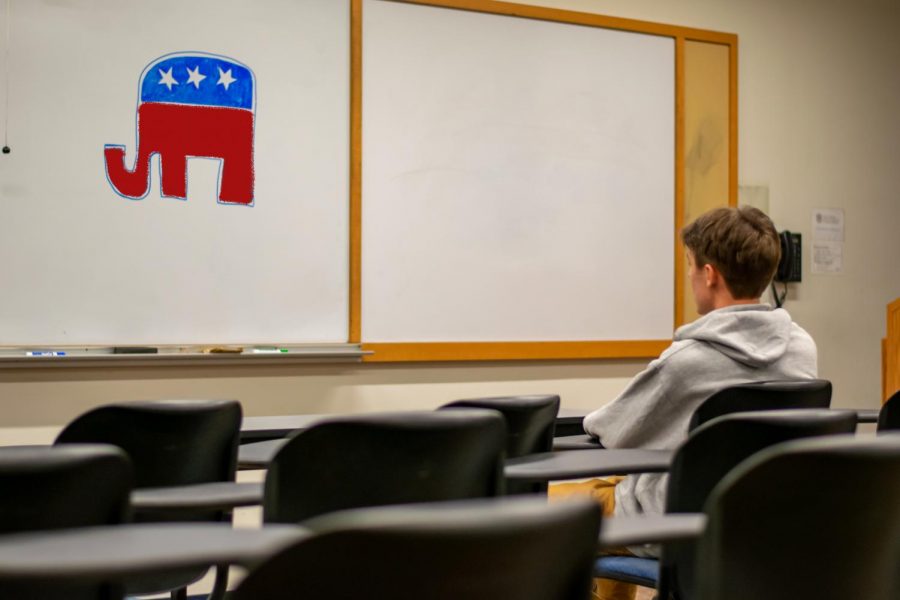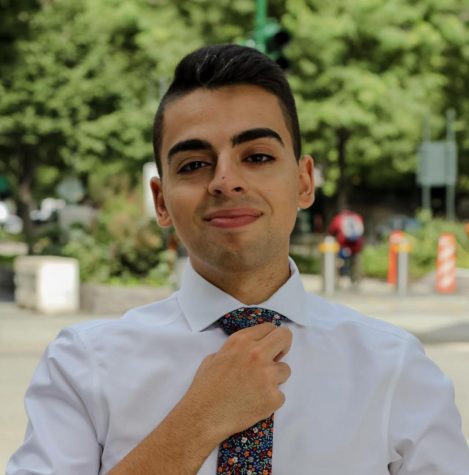SAPIENZA: What It’s Like Being a Conservative at Fordham
Opinions Column: Looking on the Right Side
Clear and measured dialogue with your peers can be difficult when you’re the only elephant in the room.
February 19, 2020
You might not know it, but there are conservatives attending the predominantly liberal Fordham Lincoln Center (FLC) campus. In a school dominated by one particular set of beliefs, it’s a challenge to be a conservative like me who disagrees with many of our campus’s politics.
In the age of divisive politics that have only gotten worse since President Trump began his aggressive tenure in office, showcasing conservative beliefs has posed a great challenge. At FLC, the atmosphere of the school is such that those who want to demonstrate their opposition to progressive politics fear being ostracized for doing so and as a result, they are forced to keep quiet.
The word Republican or conservative tends to strike fear into people, and it has created an environment of intolerance. In “Navigating Political Discussions as a Conservative Student,” a piece published in the Observer in 2017, one conservative FLC student said, “There are many students who are quick to judge, and simply won’t listen to a student who is a member of the Republican Party.”
All of this may sound ironic considering that the views many conservatives tend to have about social issues are the same ones shared by the Catholic Church and Fordham University alike.
One example of this would be the strong disagreement many conservatives have with abortion. This topic in particular is one that incites lots of emotion based on my experience at FLC. I can recall being in a philosophy class and sharing my opposition to abortion, only to be met with angry gazes, arrogant smirks and looks of disbelief. It seemed that many of my classmates had never heard a person speak out against abortion. Before I could finish my point amongst the moans and groans of those who disagreed with me, I was called a misogynist by multiple people. The only way I could respond was by reminding everyone that I am a person with an opinion, and mine is just as valuable as everyone else’s.
I’m not the only one met with these harsh words by classmates. “Although I lean left on social issues, I favor more moderate, sometimes conservative, economic policies and, as such, I am often ridiculed as being a ‘dirty centrist’ or ‘filthy moderate’ by primarily die-hard Bernie supporters,” said Chris Schultz, Fordham College Lincoln Center ’22.
There are similar liberal and conservative divisions at Rose Hill where a conservative publication called The Pamphlet was born last year. Conservative students at Rose Hill began publishing their pieces on their own conservative platform as a way of exposing students who otherwise wouldn’t know anything other than liberal view points to different beliefs.
Teddy Schoenman, the Editor-in-Chief of The Pamphlet in 2018, Fordham College Rose Hill ’20 and told the Fordham Ram that “The reason I’m excited about it is because if someone could take a perspective on an issue that people think they’ve figured out, and say, ‘Well, look, other people think about it this way,’ it might just create dialogue, but it might also make people realize that there is another way to look at things.”
Immediately shutting down conservatives through unfair assumptions and labels has a negative effect on both sides. Conservatives may be the minority political group on campus, but their opinions are still valid, and it is important for those who disagree with them to hear them out. If the behavior that scares off any conservative thought on campus continues, we create a bubble of confirmation bias.
Extending conversation to include views of all political backgrounds needs to come from the professors, tasked with generating critical discussion. Along with a heavily liberal student body, the faculty who engage in political dialogue also — from what I have seen in the courses I have taken — make their progressive views known through class readings, giving credence to only progressives. In universities, marketplaces for diverse ideas, those who hold control in the classroom need to echo that same sentiment to create an open environment for conservatives to share their beliefs.
With a heated election ahead of us in the coming months, sharing and listening to conservatives’ point of view is imperative. For many voters at FLC, this marks the first time that they will be able to vote in a presidential election.
“I am more than willing to discuss policies and their economic implications and flaws, such as banning private insurance with Medicare for All or federally guaranteeing jobs to maintain full employment, but any discussion will usually devolve into a one-sided shouting match of name-calling and moderate-bashing.” Schultz said. “If this vocal minority of left-leaning supporters continues to demonize moderate Democrats rather than having an open and civilized discussion, the results of the 2020 election may be shocking.”
FLC’s student body needs to encourage one another to listen to differing ideas which will in turn create an atmosphere where the few conservatives attending can make their views clear without fear of any intimidation or harassment. Should that happen, we will all be doing a small part in making sure that we go to the voting booth with a better understanding of the issues, and our shared understanding of our right to freely speak about our individual political views. If the FLC community can once more acknowledge and respect each other’s perspectives, the school will be a much better place for it.











